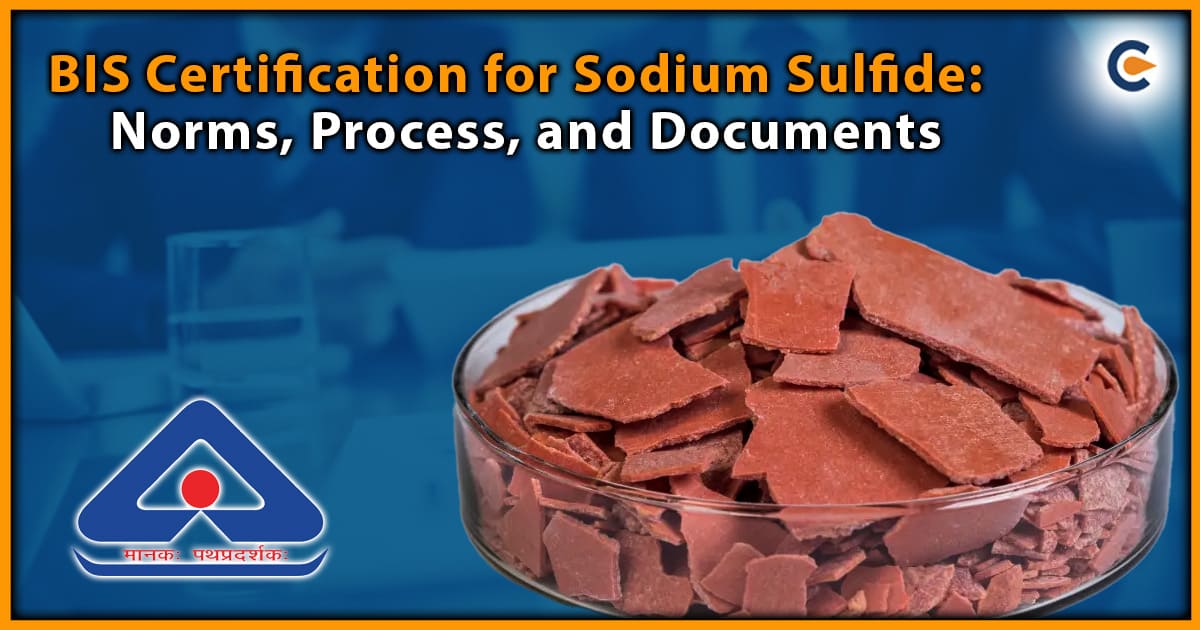Sodium sulfide is a chemical compound that has a wide range of industrial applications. It is used in the paper and pulp industry to bleach wood pulp and in water treatment to remove heavy metals and impurities. Sodium sulfide is also used in the production of dyes and pigments, which helps to make them more soluble in water for dyeing textiles. In the leather industry, sodium sulfide is used to dehair hides and skins by breaking down proteins in the hair. However, it should be handled with care as it can damage collagen fibers in the hide if not used properly. Overall, sodium sulfide is a versatile chemical that is important in various industrial processes. Sodium sulfide falls under the BIS’s Conformity Assessment Scheme. This means that its manufacturers must have a BIS license in place. This article takes a brief walkthrough of technicalities as well as legalities around BIS certification for Sodium sulfide.
Explaining the Role of Indian Standard IS297:2001
The standard IS297:2001 pertains to Sodium Sulphide and provides specifications, as well as sampling and testing methods for sodium sulphide of technical grade.
Sodium sulphide, in its technical form, should be in the form of flesh-colored or dark-brown mass or flakes, and it must be soluble in water. It finds widespread use in industries such as tanneries, dyestuffs, textiles, and ore beneficiation. Due to its caustic nature, it requires careful handling.
To ensure compliance with the standard, the material needs to undergo testing using the methods specified in the annex. Additionally, it must meet all the requirements stated in the standard.
Tests to be performed to qualify for BIS certification
To secure BIS certification for Sodium sulfide, the following tests should be cleared without fail:
- Test for Determination of water-insoluble
- Test for Determination of sodium chloride
- Test for Determination of iron and aluminium compounds
- Test for Determination of sodium sulphate
- Test for Determination of excess alkali
- Test for Determination of total sulphides, hydrosulphide, and excess alkali
- Test for Determination of reducing compounds
Packing and Marking Norms concerning BIS certification for Sodium sulfide
The packaging and marking process should adhere to the guidelines outlined in IS 297:2001. For sodium sulphide, the material must be packed in mild steel drums. Furthermore, the product’s container should bear the Standard Mark (ISI Mark) only if the material meets all the requirements specified in the standard. Each package should be securely sealed and prominently labeled with the necessary information as outlined in the standard.
To utilize the standard mark (ISI Mark), the manufacturer must obtain a license from the Bureau of Indian Standards (BIS)[1]. The BIS evaluates various factors, including manufacturing infrastructure, quality control, testing capabilities, and production process, to determine eligibility for the license.
Documents Concerning BIS Certification for Sodium Sulfide
To obtain BIS (Bureau of Indian Standards) certification for Sodium sulfide, manufacturers must provide specific documents during the certification process. These typically include:
- Application form with details about the manufacturer and product specifications,
- Documentation of the manufacturing facility’s infrastructure,
- Information about quality control measures and testing capabilities,
- A description of the production process
- Testing report
- Relevant legal and statutory documents such as incorporation certificates and permits.
It is essential for manufacturers to review BIS guidelines carefully and submit accurate and complete documentation to ensure a smooth certification process.
A Detailed Process of BIS Certification for Sodium Sulfide
To secure BIS certification for Sodium sulfide, manufacturers must go through a specific process. Here are the detailed steps involved:
1. Application Submission
Manufacturers must furnish a completely-filled application to the BIS to initiate the registration process for Sodium sulfide. The application should entail all the required information and paperwork required by the BIS.
2. Document Verification
The BIS deliberately vets the paperwork to ensure they meet the required norms. This verification process involves examining the manufacturer’s infrastructure, testing capabilities, quality control measures, and the production process used.
3. Factory Inspection
The BIS may perform an in-depth inspection of the manufacturer’s facility to measure its compliance level with the underlying standards. During the vetting, BIS representatives examine the manufacturing processes, equipment, as well as facilities to ensure they adhere to the necessary criteria.
4. Sample Testing
The BIS may request the applicant to render samples of Sodium sulfide for testing purposes. These samples are tested in laboratories to verify compliance with the underlying standards and quality parameters.
5. Evaluation and Assessment
Based on document assessment, factory inspection, & sample testing, the BIS evaluates the manufacturer’s compliance with the underlying norms and guidelines. The assessment takes different factors into consideration such as quality control, adherence to manufacturing practices, and the overall quality of the product in question.
6. Grant of License
If the manufacturer successfully meets all the requirements and standards set by the BIS, a BIS license is granted for Sodium sulfide. This license indicates that the manufacturer’s product complies with the specified standards and is eligible to bear the ISI (Indian Standards Institute) mark.
It is important to note that the BIS certification process may involve additional steps or requirements depending on the specific regulations and guidelines established by the BIS for Sodium sulfide.
Manufacturers are advised to carefully follow the instructions provided by the BIS, provide accurate information throughout the certification process, and ensure compliance with all relevant standards to achieve a smooth and successful certification outcome.
Conclusion
Not securing BIS certification for Sodium sulfide has the following implications: restricted market access, loss of trust and reputation, compliance issues, competitive disadvantage, and safety and quality concerns. Without certification, accessing certain markets and customers becomes difficult, trust in your product may be diminished, and compliance with regulations becomes a challenge. Competitors with certification have an advantage, and there may be doubts about the safety and quality of your product. Addressing deficiencies and working towards meeting the required standards is essential for market acceptance and regulatory compliance.
Read Our Article: How To Apply For BIS Certification In India?













